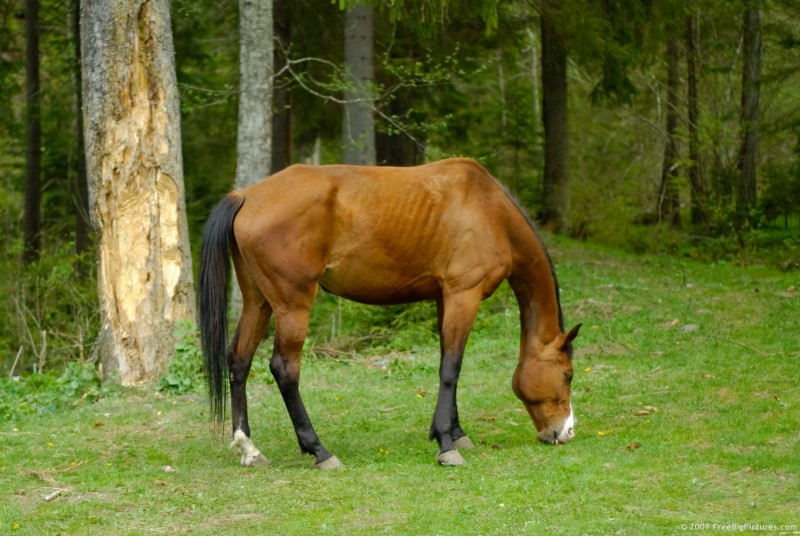 In my recent article on Colic Myths (CLICK HERE if you’d like to see it), one reader, while noting that I had pointed out some myths (to the apparent dismay of some internet experts), asked what-I-thought was a great question. She said, essentially, “So myths are all well and good, but what would you tell us to do for colic?”
In my recent article on Colic Myths (CLICK HERE if you’d like to see it), one reader, while noting that I had pointed out some myths (to the apparent dismay of some internet experts), asked what-I-thought was a great question. She said, essentially, “So myths are all well and good, but what would you tell us to do for colic?”
The door was opened. Here goes.
COLIC IS NOT A DISEASE
First of all, “colic” is not a disease. Colic is a clinical sign. To be specific, it is a fairly recognizable type of pain, that is, it is a fairly recognizable sign of pain that comes from the horse’s abdomen. Horses with colic may look at their sides, roll, get up and down, not eat, and such. And given that colic pain is the most common sign of a medical problem in the horse – accounting for something like 50% of all medicine cases – it makes some sense that many people who have been around horses for a fairly short period of time can fairly readily identify some of the signs typical of painful colic. But – and this is important – while they may be able to recognize colic, they can’t know exactly what’s going on inside the horse. Nobody can – not from the outside. This is where veterinarians can be particularly helpful (more on that in a bit).
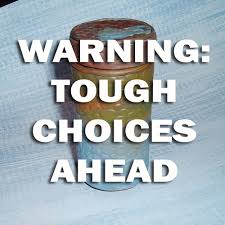 That said, the first thing that I’d like for you to consider is that if your horse is showing the signs of pain that we call, “colic,” there is only one of two broad reasons.
That said, the first thing that I’d like for you to consider is that if your horse is showing the signs of pain that we call, “colic,” there is only one of two broad reasons.
- He has a problem that will require surgery
- He has a problem that will not require surgery
As such, and insofar as getting your horse over a colic, the most important thing that needs to be done is to determine if the horse has a surgical problem, and as quickly as possible. (HINT: That’s where your veterinarian comes in.)
If your horse is unlucky enough to have a colic problem that will require surgery, no treatment that you have, that I have, or that anyone else has will make is so that he doesn’t require surgery. If someone thinks that a horse has a twisted intestines, and he that he got better because of something that was done, then there’s only one explanation: the horse didn’t have a twisted intestines (these things don’t correct on their own). And all the pain reliever in the world won’t help, because it will, at worst, cover up the real problem, until, possibly, it’s too late. But I’m getting off point.
 FIRST THING: SET UP A RELATIONSHIP WITH YOUR VETERINARIAN
FIRST THING: SET UP A RELATIONSHIP WITH YOUR VETERINARIAN
While most of us really do like treating horses, we don’t really like getting a phone call along the lines of, “Well, I’ve called three people who didn’t answer the phone, so I called you.” (By the way, I’ll still come, because I really like horses.) But try to find someone that you know and trust: someone that you know will be there when you need him or her, that knows you, and knows your horse. It’s important.
SECOND THING: BE PREPARED FOR THE WORST
When it comes to colic, and you think you’d be wiling to take your horse with colic to surgery, then you should do is to observe the old Boy Scout motto and, “Be Prepared.” And specifically, here are some things you should do.
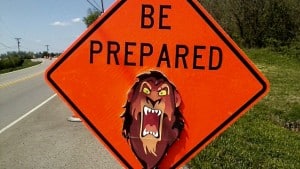 1. Know what you’re going to do before you have to do it. Colic surgery is a very expensive endeavor, and you have to decide if you would shell out $10,000 (and often much more) for a surgery to save your horse. This is a decision that you should make while you’re not crying your eyes out and/or worrying to death about whether or not you are going to lose your horse.
1. Know what you’re going to do before you have to do it. Colic surgery is a very expensive endeavor, and you have to decide if you would shell out $10,000 (and often much more) for a surgery to save your horse. This is a decision that you should make while you’re not crying your eyes out and/or worrying to death about whether or not you are going to lose your horse.
2. If you can’t afford to pay for colic surgery, and you would still want to do colic surgery, see if you can get insurance for your horse. They will help pay for it (assuming that your horse qualifies – not all do).
3. If you’re going somewhere, and won’t be available, have an emergency plan set up. More than once I’ve been in the terrible situation with a horse with a serious colic, and an owner that’s unreachable. I had to put the horses down, because they were suffering, and no one is going to assume the financial burden of doing surgery without knowing who the owner of the horse is.
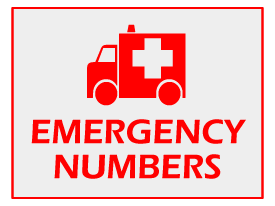 4. If you have insurance for your horse, keep your insurance company’s number close at hand. You’re going to have to tell them what’s going on, and your veterinarian will have to tell them, too. And you may need to do this in a hurry. Keep that number handy!
4. If you have insurance for your horse, keep your insurance company’s number close at hand. You’re going to have to tell them what’s going on, and your veterinarian will have to tell them, too. And you may need to do this in a hurry. Keep that number handy!
5. Speaking of phone numbers, do you have a horse trailer? If not, find numbers of people who do. Several numbers. If you’re willing to get your horse to the hospital for surgery, then try to have some idea how it’s going to happen before it has to happen. You have no idea how frustrating it is – speaking as someone who has been in this situation more than a few times – to have a horse that needs surgery, and owner that’s wiling to pay for surgery, but to have no idea how the horse is going to get to surgery. With any luck, your veterinarian will have a few numbers (I do), but you should really have this all set up beforehand.
And then, you’ll be ready.
THIRD THING: “OK, I’M PREPARED,” (you say). “NOW WHAT?”
Well, the first thing that you should do, having set up a relationship with a veterinarian, is give him or her a call if your horse has a colic. If that’s all I said, and stopped there, honestly, I’d be doing many people a favor, and especially some that are already experts in their own minds. If you horse is showing signs of colic, ask questions of your veterinarian, and let him or her know about your concerns. It’ll help you be more confident about what you’re doing, if nothing else. Maybe your veterinarian will give you a couple of tips; maybe he or she will want to come out 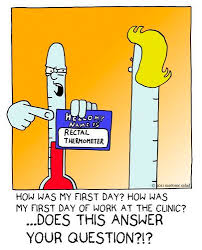 and see what’s going on. Remember, your veterinarian is supposed to know more than you do, and he or she probably even knows more than your friends who say that veterinarians don’t know anything.
and see what’s going on. Remember, your veterinarian is supposed to know more than you do, and he or she probably even knows more than your friends who say that veterinarians don’t know anything.
But before you call, there are a couple of things that you can do, so as to make your call more useful.
- Take your horse’s temperature. With any luck, you know how to take you’re horse’s temperature. If not, learn. It’s not hard, although sometimes it’s not a lot of fun. Anyway, the reason that you should take your horse’s temperature is that it can provide some very important information. You see, if your horse has a fever, it’s unlikely (although possible) that is colic is related to an intestinal problem that will require surgery. He may need treatment, for sure, but knowing your horse’s temperature can provide your veterinarian with useful information and it can help direct treatment.
 Take your horse’s pulse. A normal adult horse’s pulse is usually 30-some beats per minute. There are a couple of ways that you can do this. It takes just a bit of practice to find a horse’s pulse at places like the transverse facial artery by the eye, (there are other spots, too). Or, if you really want to look like a pro, and be the envy of all your friends, you can get a stethoscope and listen to the heart rate. Either way, knowing the pulse rate is a good bit of information to convey to your veterinarian, because it can help him or her know how bad things might be (in general, the higher the pulse rate, the more serious the problem).
Take your horse’s pulse. A normal adult horse’s pulse is usually 30-some beats per minute. There are a couple of ways that you can do this. It takes just a bit of practice to find a horse’s pulse at places like the transverse facial artery by the eye, (there are other spots, too). Or, if you really want to look like a pro, and be the envy of all your friends, you can get a stethoscope and listen to the heart rate. Either way, knowing the pulse rate is a good bit of information to convey to your veterinarian, because it can help him or her know how bad things might be (in general, the higher the pulse rate, the more serious the problem).
Then, of course, convey that information to your veterinarian when you call.
FOURTH THING: “GREAT,” (you say). “I’VE GOTTEN THAT INFORMATION. I’VE CALLED MY VETERINARIAN. BUT WHAT DO I DO WHILE I’M WAITING FOR THE VETERINARIAN? MY HORSE IS IN PAIN!”
Seriously now, isn’t that really the crux of your worries? Your horse is in pain, and you’re worried about it. You don’t want to let him sit there and suffer – so what do you do? What can you do to help your horse deal with the pain until either 1) It goes away, or 2) The veterinarian gets there?
Here are the things that I usually tell my clients.
 If your horse is lying comfortably, let him lie comfortably.
If your horse is lying comfortably, let him lie comfortably.- If your horse is in a stall, and is rolling around, don’t let him roll around in the stall. Horses can beat themselves up pretty thoroughly if they are allowed to thrash in a confined space.
- See if a bit of exercise can get his mind off the colic, or move some gas, or something. I prefer that people trot the horse on a lunge line, but, of course, people will walk horses (it seems to be something of a rule), or put them in a trailer, or do any number of things to try to help. However, as I noted in my colic myths article, I think that this often helps placate the owner, because while I’ve certainly seen horses respond to a bit of exercise/trailering/whatever, I’ve also seen horses walked to death, and lots of horses for which exercise was no help at all.
BRIEF ASIDE: Here’s something to keep in mind about walking, lunging, etc., and calling it a colic “cure.” You never really do know if the walking, lunging, etc., helped the problem resolve, or if the problem resolved on its own while you were doing something. CLICK HERE to read my article about that.
OH, ONE OTHER THING: No matter what you do for a horse with colic pain, if the pain subsides, the treatment is going to get the credit, deserved or not. That’s one of Ramey’s Rules.
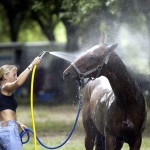 Another way to distract horses from the pain of a colic is to run water on their heads. I’ve used this at horse shows from time to time on non-serious colic cases when you can’t give a pain relieving medication because it would disqualify the horse from showing. After first checking to see that the horse’s colic is not likely to be serious (CLICK HERE to read my article about things that indicate your horse might need colic surgery), I might recommend that the horse go to the wash rack to get his head hosed off. Most horses hate that, they shake their heads, they snort, and they sometimes forget about their pain. Call it colic hydrotherapy.
Another way to distract horses from the pain of a colic is to run water on their heads. I’ve used this at horse shows from time to time on non-serious colic cases when you can’t give a pain relieving medication because it would disqualify the horse from showing. After first checking to see that the horse’s colic is not likely to be serious (CLICK HERE to read my article about things that indicate your horse might need colic surgery), I might recommend that the horse go to the wash rack to get his head hosed off. Most horses hate that, they shake their heads, they snort, and they sometimes forget about their pain. Call it colic hydrotherapy.
 I am not a fan of people using pain relieving drugs indiscriminately. It seems that pretty much everyone in the horse community keeps flunixin meglumine (Banamine®) close at hand. On the one hand, I don’t have any fundamental objection to a horse getting a dose of flunixin prior to me seeing it – it doesn’t really interfere with my ability to assess the situation, since it is not a potent pain reliever (please note the word potent and CLICK HERE If you want a reference). But on the other hand, if all you’re trying to do is to treat colic pain, then you’re also not treating the underlying problem. Otherwise stated, if you can treat the problem, the pain will go away. Thus, I usually prefer that if people want to give a pain reliever – and they usually do – that they call and we talk about it, first. I don’t want people just trying to cover up the real problem.
I am not a fan of people using pain relieving drugs indiscriminately. It seems that pretty much everyone in the horse community keeps flunixin meglumine (Banamine®) close at hand. On the one hand, I don’t have any fundamental objection to a horse getting a dose of flunixin prior to me seeing it – it doesn’t really interfere with my ability to assess the situation, since it is not a potent pain reliever (please note the word potent and CLICK HERE If you want a reference). But on the other hand, if all you’re trying to do is to treat colic pain, then you’re also not treating the underlying problem. Otherwise stated, if you can treat the problem, the pain will go away. Thus, I usually prefer that if people want to give a pain reliever – and they usually do – that they call and we talk about it, first. I don’t want people just trying to cover up the real problem.
- Take away feed. In most cases, a horse with colic won’t eat, so this isn’t really a problem. But I don’t think it’s a good idea to throw a lot of feed into a gut where things aren’t working normally anyway. So, I usually recommend removing the feed from a horse with colic until you have a good handle on things.
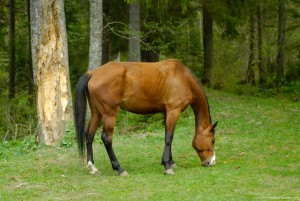 Let him eat a little fresh grass. Yes, I know, that’s the exact opposite of the preceding suggestion. But a little bit of easy-to-digest feed is a stimulant to bowel movement, and the willingness to eat is a sign that things aren’t all that bad, or that they are getting back to normal. Offering a horse a bit of grass is mostly a test, and it can provide some useful information.
Let him eat a little fresh grass. Yes, I know, that’s the exact opposite of the preceding suggestion. But a little bit of easy-to-digest feed is a stimulant to bowel movement, and the willingness to eat is a sign that things aren’t all that bad, or that they are getting back to normal. Offering a horse a bit of grass is mostly a test, and it can provide some useful information.
Of course, there’s lots more to this whole colic thing. Once I get to the horse, my job is to see if he needs surgery or not, and to try to figure it out as fast as I can. Figuring that out is a whole ‘nother thing. If he doesn’t need surgery, there are many treatment options at my disposal. And the good thing is that the vast majority of horses that experience a colic recover without surgery and go on and do just fine. All stuff for another article, I suppose.
But anyway, you wanted to know what I might tell you to do before the veterinarian gets to the scene. Follow your veterinarian’s instructions, and always ask questions if you would like to understand something better. And to tell you the truth, I hope that you never have to use any of these suggestions. Wouldn’t it be a great thing for horses if they never had to colic?

